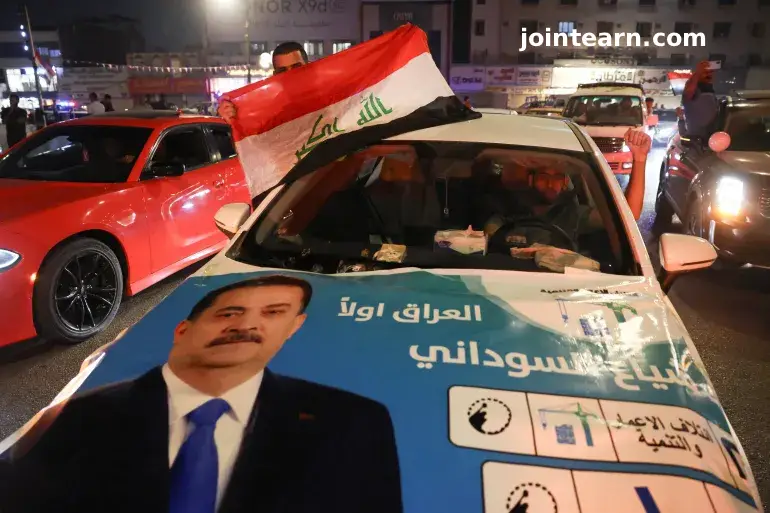
Iraqi Prime Minister Mohammed Shia al-Sudani’s coalition has emerged as the winner in Iraq’s parliamentary elections, according to official results released by the Independent High Electoral Commission (IHEC). The Reconstruction and Change Coalition, led by al-Sudani, secured approximately 1.3 million votes, outperforming its closest rival by about 370,000 votes.
The election results mark a significant moment in Iraq’s political landscape, yet no party or coalition achieved a majority in the 329-member legislature, meaning intensive negotiations and deal-making will be required to form the next government.
Voter Turnout and Public Sentiment
Following the preliminary results, al-Sudani praised the voter turnout of 56 percent, describing it as “clear evidence of another success” and a sign of renewed confidence in Iraq’s political system.
Despite this optimism, many voters remained disillusioned. Skepticism about entrenched political parties and their management of Iraq’s oil wealth persisted. In areas like Baghdad and Najaf, turnout was notably lower, partly due to a boycott call by Shia leader Muqtada al-Sadr, head of the Sadrist Movement, who criticized the election as flawed.
Regional Voting Patterns and Surprises
As expected, Shia candidates dominated Shia-majority provinces, Sunni candidates prevailed in Sunni-majority regions, and Kurdish parties won in Kurdish-majority provinces. However, several unexpected outcomes emerged:
- In Nineveh, a predominantly Sunni Arab province, the Kurdistan Democratic Party (KDP) secured the highest number of seats.
- In Diyala, which has a significant Kurdish minority, no Kurdish candidates won seats for the first time since 2005.
These shifts underscore the evolving political dynamics in Iraq and may influence coalition-building efforts in the coming weeks.
Coalition-Building and Government Formation
No party in Iraq has won a majority in parliament since the U.S.-led invasion in 2003, meaning governments are formed through alliances and power-sharing arrangements. Political experts predict months of negotiations before a new administration is finalized.
“None of the political factions or movements over the past 20 years have been able to gain a total majority … this will lead to rounds of negotiations and bargaining among political factions,” said Al Jazeera’s Ali Hashem, reporting from Baghdad.
The previous parliamentary cycle saw al-Sadr’s bloc emerge as the largest in 2021, only for him to withdraw from parliament after a dispute with Shia parties that refused to back his bid to form a government.
Historical Context
This election is Iraq’s sixth since the 2003 U.S.-led invasion, which toppled Saddam Hussein, triggered a prolonged sectarian conflict, and contributed to the rise of extremist groups like ISIL (ISIS). Iraq continues to grapple with corruption, underdeveloped infrastructure, and social challenges, including unemployment and limited access to education and healthcare.
Challenges Ahead for Al-Sudani
Prime Minister al-Sudani faces the dual challenge of addressing domestic priorities while balancing Iraq’s international relations, particularly with the United States and Iran. His administration will need to focus on:
- Economic development and job creation
- Education and healthcare reform
- Reducing corruption and improving governance
- Maintaining geopolitical stability amid shifting regional dynamics
Political analysts suggest that the coalition-building process will be complicated, but al-Sudani’s coalition leads the initial bargaining position.
Conclusion
While al-Sudani’s coalition has emerged as the frontrunner in Iraq’s parliamentary election, the absence of a clear majority ensures that government formation will require complex negotiations among Iraq’s political blocs. As Iraq navigates these challenges, citizens are closely watching the government’s ability to deliver on promises of economic growth, security, and public services.


Leave a Reply